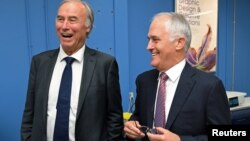Another Australian lawmaker announced his resignation Saturday over a constitutional ban on dual citizens sitting in Parliament, triggering a second by-election that could cost the government its fragile grip on power.
John Alexander revealed Monday that he was waiting on advice from the British Home Office on whether he had inherited citizenship from his English-born father who migrated as a child in 1911. On Saturday, the 67-year-old former professional tennis player told reporters the “balance of probability of evidence is that I most likely am” a dual citizen.
“The obligation that I have is that once I do not hold the view that I’m solely Australian, I must resign,” Alexander said.
Second resignation
Deputy Prime Minister Barnaby Joyce is contesting his seat at a by-election on Dec. 2 after the High Court last month disqualified him because he had inherited the citizenship of his New Zealand father. He immediately renounced his New Zealand citizenship.
Alexander also plans to renounce any British citizenship and run for his Sydney-based seat. No date has yet been set for a by-election.
Before the current citizenship crisis bit into the ranks of Prime Minister Malcolm Turnbull’s conservative coalition, they held only 76 seats in the 150-seat House of Representatives where parties need a majority to govern.
Turnbull congratulated Alexander on his resignation and called on lawmakers in the center-left opposition Labor Party who knew they were dual nationals when they nominated for the last election to also resign.
Senior Labor lawmaker Tony Burke said all of his colleagues under a cloud had taken “reasonable steps” to renounce second nationalities before they were elected. The High Court ruled in the 1990s that candidates who have taken “all reasonable steps” to renounce their foreign nationality but failed, perhaps because the country refuses to accept they are not citizens, are eligible to sit in Parliament.
“This is now a government without a majority. It’s a prime minister without authority,” Burke told reporters.
But Labor has only 69 lawmakers in the House, with five independent lawmakers holding the remaining seats that the government doesn’t. One of those independents is also under a cloud because Britain didn’t officially cancel her citizenship until after she signed the election nomination form as an eligible candidate.
Rare ban
Australia is rare if not unique in the world in banning dual nationals from sitting in Parliament.
The constitutional quirk had rarely been an issue in its 116-year history, although many dual citizens are suspected to have escaped detection. Only two elected lawmakers had ever been disqualified over foreign citizenship, in 1996 and 1998, before the current Parliament was elected in 2016.














